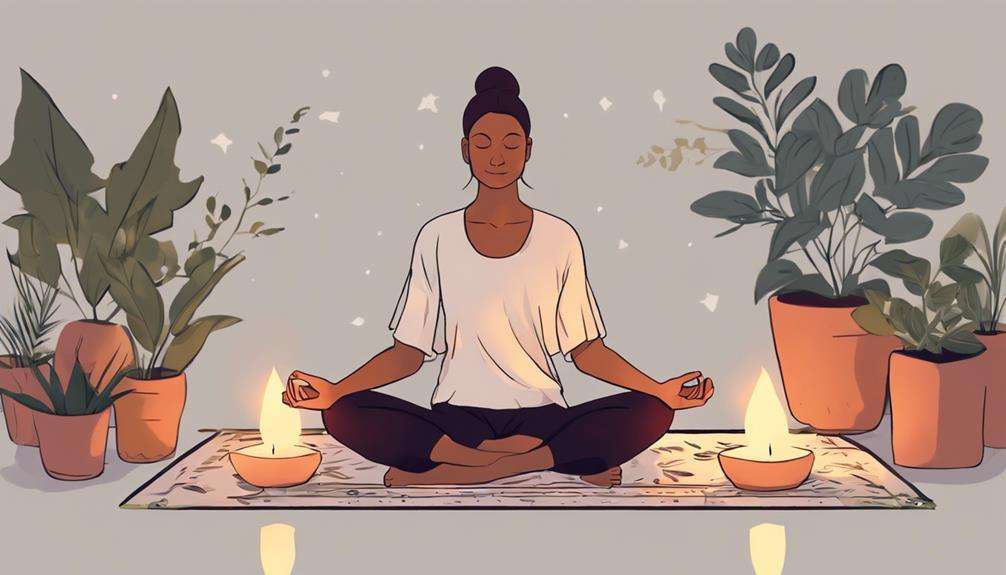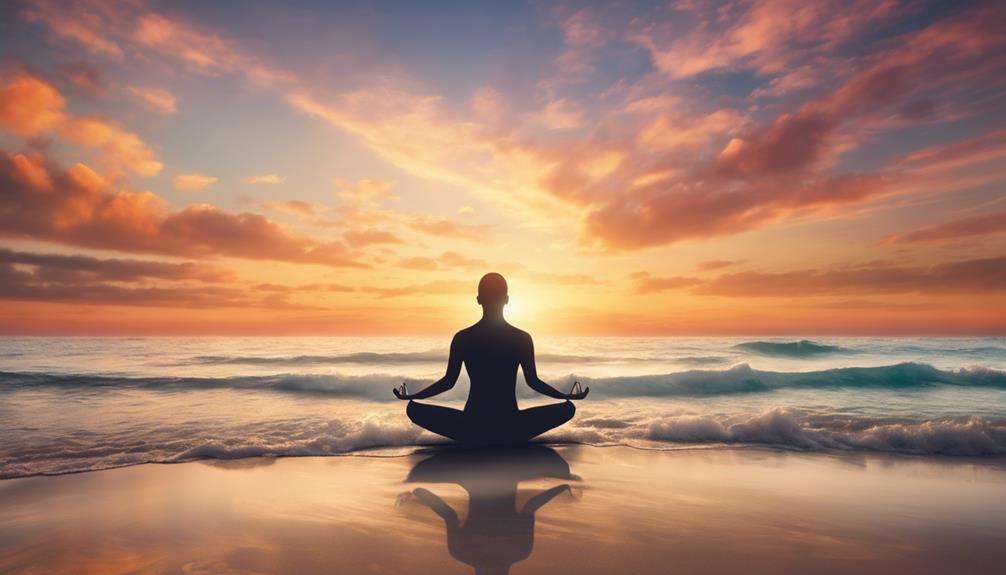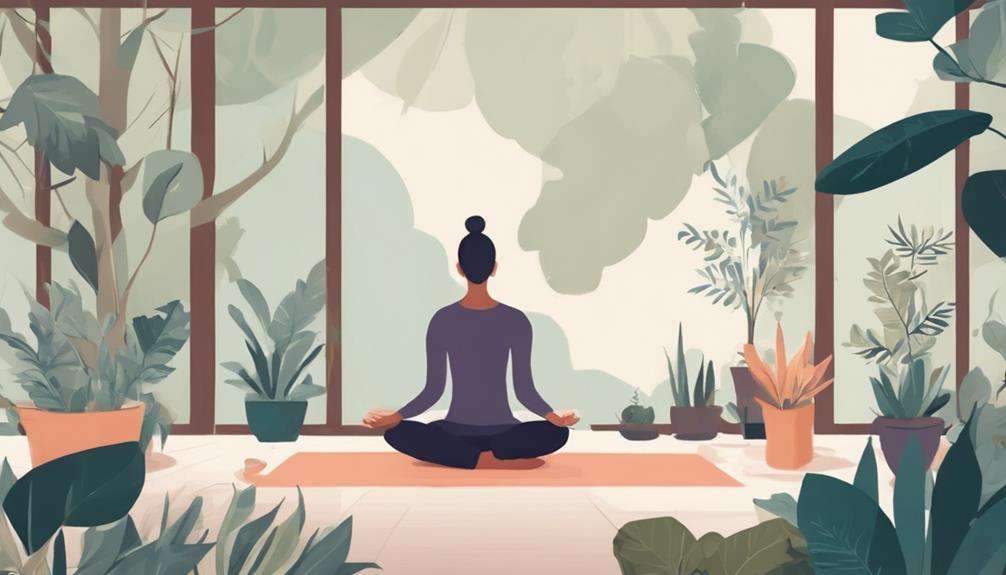Have you ever wondered how yoga can impact your emotional equilibrium?
The practice of yoga goes beyond physical exercise; it holds a profound influence on your mental and emotional well-being.
As you explore the multifaceted aspects of yoga in relation to your emotional balance, you will uncover a wealth of techniques and practices that can transform how you navigate your inner world.
Key Takeaways
- Yoga integrates mind-body practices to release emotional tension.
- Breathing techniques in yoga regulate emotions and enhance self-awareness.
- Yoga Nidra and mindfulness meditation foster inner peace and emotional balance.
- Mindfulness meditation offers lasting tranquility, emotional stability, and improved mental health.
The Mind-Body Connection in Yoga
The mind-body connection in yoga plays a pivotal role in fostering emotional balance by emphasizing the interconnectedness of your mental and physical well-being. When practicing yoga, you're encouraged to explore this connection, recognizing how emotional issues can manifest physically in the body. Research has shown that yoga serves as a powerful tool for releasing emotional tension stored in the body, offering a holistic approach to emotional well-being. By integrating physical postures, breathing techniques, and meditation, yoga provides a platform to address emotional challenges effectively.
Yoga's focus on the mind-body connection not only benefits your physical health but also contributes significantly to your mental health. Through the practice of yoga, you can cultivate a deeper awareness of your emotions and how they influence your body. This heightened awareness allows you to proactively address emotional imbalances, promoting a sense of calm and stability in your daily life. Embrace the mind-body connection in yoga as a pathway to nurturing your emotional well-being and achieving a harmonious balance within yourself.
Yoga Poses for Emotional Stability
Exploring yoga poses specifically tailored to enhance emotional stability can provide a transformative experience for your well-being, offering a pathway to inner peace and balance. These poses not only benefit your physical health but also contribute significantly to your mental balance. Incorporating yoga poses into your practice can help you manage stress, anxiety, and overwhelming emotions effectively.
Here are five yoga poses that promote emotional stability:
- Child's Pose (Balasana): Calms the mind, relieves stress, and aids emotional balance.
- Bridge Pose (Setu Bandhasana): Opens the heart center, fostering feelings of love and compassion.
- Legs-Up-the-Wall Pose (Viparita Karani): Reduces anxiety, improves circulation, and supports emotional well-being.
- Forward Fold (Uttanasana): Releases tension and helps quiet the mind for emotional stability.
- Corpse Pose (Savasana): Cultivates a sense of inner peace and relaxation, promoting emotional balance in your practice.
Incorporating these poses into your yoga routine can enhance your emotional stability and overall well-being.
Breathing Techniques for Emotional Balance
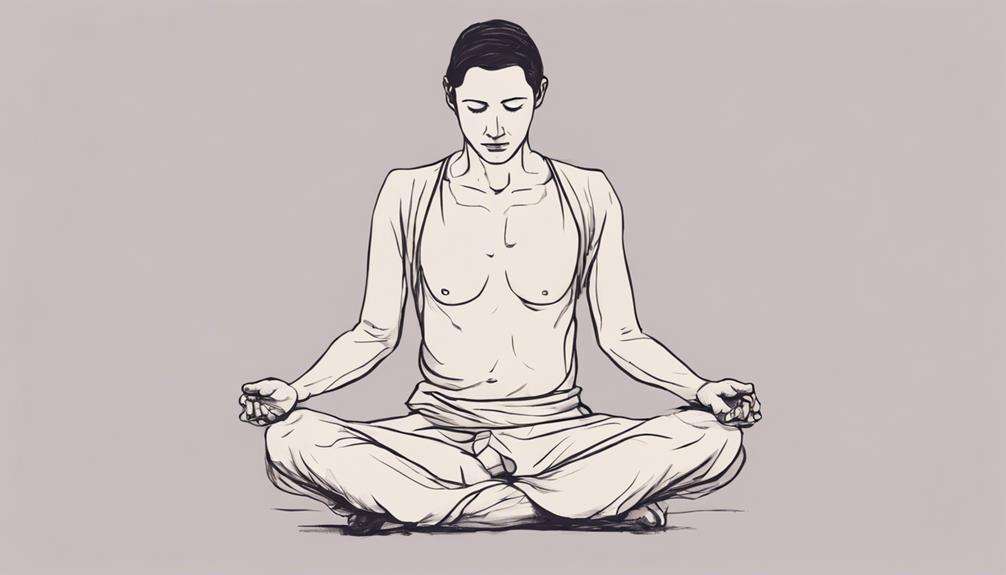
Enhancing your emotional balance through yoga involves incorporating specific breathing techniques that promote relaxation and inner peace. Deep belly breathing, a fundamental practice in yoga, helps calm both body and mind by activating the parasympathetic nervous system.
Techniques like Nadi Shodhana, or alternate nostril breathing, are particularly effective in reducing stress and anxiety, fostering emotional equilibrium. Bhramari pranayama, known as the humming bee breath, aids in restoring emotional balance by soothing the mind and nervous system.
Mindful breathing during yoga practice enhances self-awareness, allowing you to identify and address negative emotional patterns. By incorporating these breathing techniques into your routine, you can regulate your emotions, enhance mental clarity, and cultivate inner peace.
Through focused breath work, yoga offers a powerful tool for managing emotions and promoting overall well-being.
Yoga Nidra for Inner Peace
Inducing deep relaxation and promoting inner peace, Yoga Nidra is a guided meditation technique known for its ability to reduce stress and anxiety. This practice goes beyond just relaxation; it delves into the realms of emotional balance, self-awareness, and mindfulness. By calming the nervous system, Yoga Nidra helps you find a sense of inner peace amidst life's chaos. Here are some key benefits of incorporating Yoga Nidra into your routine:
- Stress Reduction: By guiding you into a state of deep relaxation, Yoga Nidra helps alleviate stress and anxiety.
- Emotional Balance: This practice fosters self-awareness, allowing you to navigate your emotions with more ease.
- Improved Concentration: Through regular practice, Yoga Nidra can enhance your focus and concentration levels.
- Enhanced Self-awareness: By promoting mindfulness, Yoga Nidra helps you stay present and aware of your thoughts and feelings.
- Greater Inner Peace: Ultimately, the goal of Yoga Nidra is to cultivate a lasting sense of tranquility and inner peace in your daily life.
Chakra Balancing Through Yoga Practice
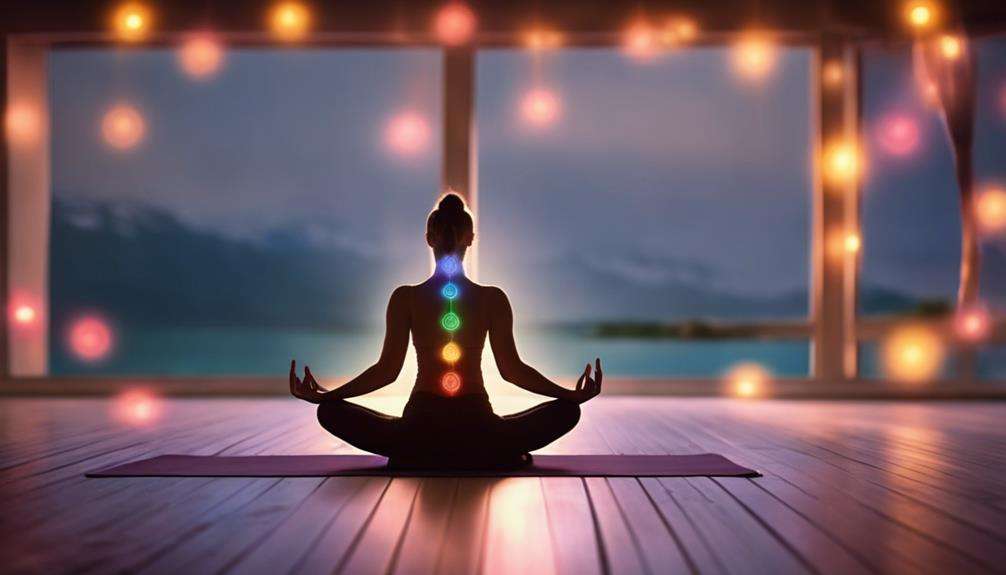
When practicing yoga for chakra balancing, you'll focus on aligning your energy centers to enhance emotional well-being.
Through meditation, yoga poses, and breathing techniques, you can work towards balancing your chakras.
These practices can help you heal emotional blockages and cultivate inner harmony.
Energy Centers Alignment
By incorporating specific yoga postures, breathwork, and meditation techniques, you can effectively align and balance your energy centers, known as chakras, for emotional harmony and well-being. Aligning your chakras through yoga practice can have a profound impact on your overall well-being. Here are some key ways in which energy centers alignment can benefit you:
- Enhances emotional stability and resilience.
- Improves focus and concentration.
- Boosts self-confidence and self-awareness.
- Facilitates better communication and relationships.
- Promotes a sense of inner peace and contentment.
Taking the time to balance your chakras through yoga can lead to a more balanced and fulfilling life, both emotionally and spiritually.
Meditation for Balance
To deepen your emotional balance through yoga practice, consider integrating meditation techniques specifically designed for chakra balancing.
Chakra balancing in yoga focuses on the energy centers in your body that influence emotional well-being. By practicing meditation and specific yoga poses targeting individual chakras, you can restore harmony and balance within yourself.
This practice helps release emotional blockages, leading to increased self-awareness and inner peace. Regularly engaging in chakra balancing yoga can enhance your emotional stability and bring a sense of calmness to your life.
Embrace these techniques to nurture your emotional balance and foster a deeper connection with yourself.
Healing Through Postures
Engage in yoga postures specifically tailored for chakra balancing to align and activate your body's energy centers for emotional healing and balance. By focusing on these specific postures, you can tap into the power of chakra balancing for enhancing your emotional well-being. Here's how you can benefit from healing through postures:
- Enhance self-awareness by connecting with your body's energy flow.
- Develop emotional resilience through the release of blocked energy.
- Cultivate inner peace by promoting harmony within your energy centers.
- Support emotional healing by targeting specific chakras linked to your emotions.
- Achieve a sense of emotional balance by practicing yoga postures that address your energy centers.
Through these practices, you can nurture a deeper understanding of yourself and foster emotional stability.
Mindfulness Meditation for Emotional Wellbeing
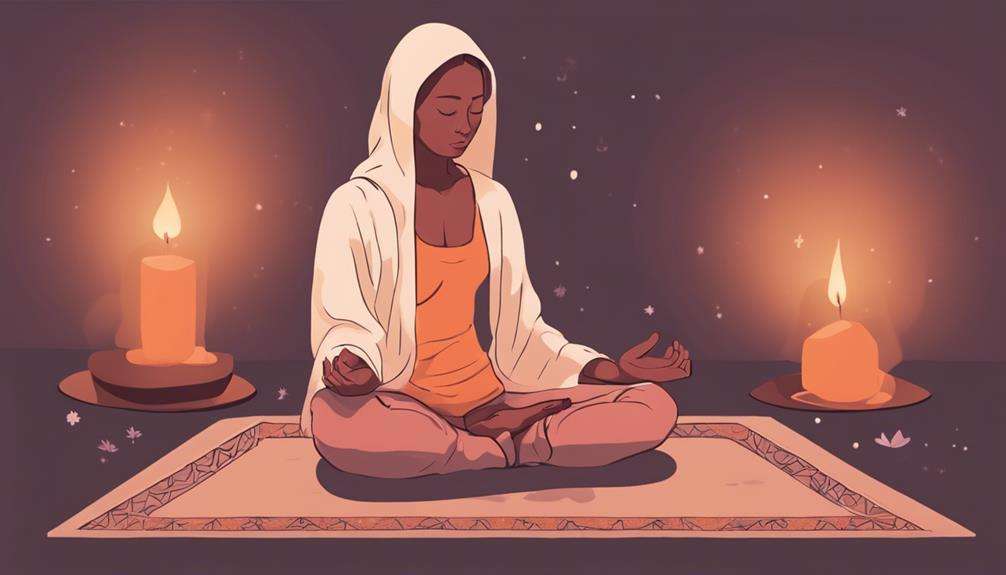
Mindfulness meditation practiced in yoga offers a powerful tool for enhancing emotional well-being through cultivating present moment awareness. By engaging in mindfulness meditation, you can observe your thoughts and emotions without judgment, which in turn reduces reactivity to challenging situations.
This practice has been linked to a decrease in symptoms of anxiety and depression, providing a sense of calm and clarity amidst life's ups and downs. Regularly incorporating mindfulness meditation into your routine can lead to increased emotional resilience and self-acceptance.
Studies have shown that mindfulness meditation improves emotional regulation and overall mental health, allowing you to navigate stressors with greater ease and composure. Embracing this practice can empower you to connect more deeply with your inner self, fostering a sense of balance and tranquility in the face of life's uncertainties.
Take a moment each day to sit in stillness, breathe, and observe the present moment with kindness and curiosity.
Frequently Asked Questions
How Does Yoga Help You Emotionally?
Yoga helps you emotionally by providing stress relief, regulating mood, and enhancing mind-body connection. It fosters self-awareness, triggers the relaxation response, and builds coping skills. As an empowerment tool, yoga cultivates resilience and facilitates emotional release.
What Effect Does Yoga Have on Emotional Intelligence?
Yoga enhances self-awareness and self-regulation, improving stress management, mood regulation, and empathy development. The mind-body connection in yoga fosters emotional resilience and clarity of thought, aiding in anxiety reduction and coping skills development.
What Yoga Pose Promotes Emotional Stability and Strength?
Child's Pose, also known as Balasana, fosters emotional stability and strength by calming your mind, reducing stress, and promoting relaxation. Regular practice can center your emotions, enhance well-being, and build inner peace.
How Important Yoga Is for Mental Health?
Yoga is vital for mental health, offering stress relief, mood regulation, anxiety reduction, and self-awareness. It connects your mind and body, fostering emotional resilience, coping skills, inner peace, and a happiness boost.
Conclusion
As you continue your yoga practice, remember that each breath and pose is like a gentle wave, soothing your mind and balancing your emotions.
Just as a skilled sailor navigates the sea with grace, you too can navigate the ups and downs of life with ease through yoga.
Embrace the power of this ancient practice to find inner peace and emotional stability.
You're the captain of your own ship, charting a course towards harmony and wellbeing.


